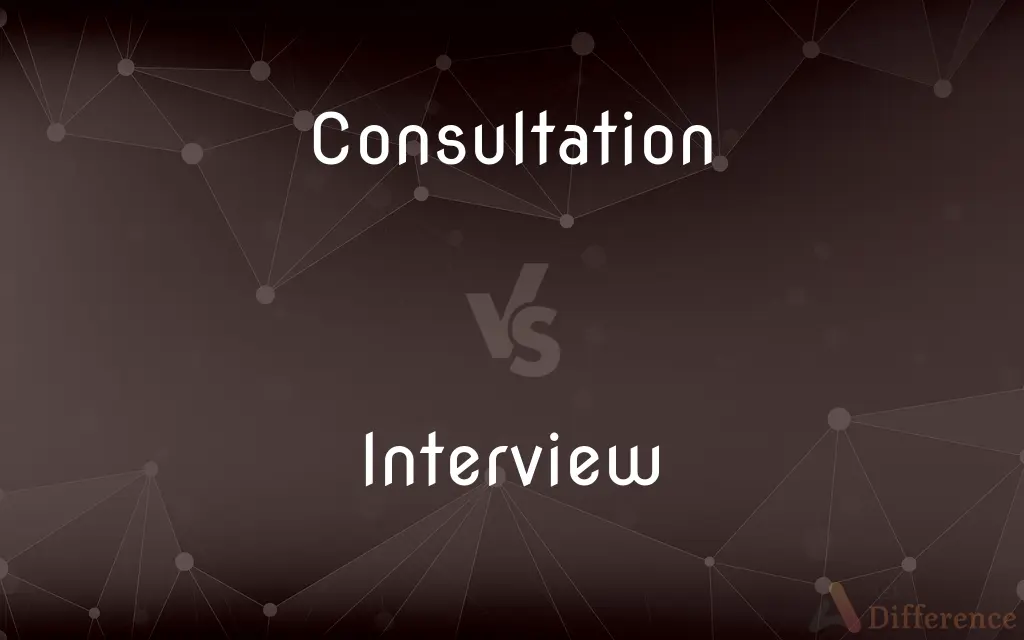Consultation vs. Interview — What's the Difference?
Edited by Tayyaba Rehman — By Maham Liaqat — Updated on April 5, 2024
Consultation involves seeking expert advice or information, while an interview is a formal meeting to assess qualifications or gather information.

Difference Between Consultation and Interview
Table of Contents
ADVERTISEMENT
Key Differences
Consultation is a process where advice or expertise is sought from someone knowledgeable in a specific area, focusing on problem-solving or decision-making. An interview, on the other hand, is a structured conversation where questions are asked to evaluate an individual’s suitability for a job, role, or purpose. Consultations are typically collaborative, aiming to address a specific issue or need, whereas interviews are evaluative, designed to gather insights or assess competencies.
In consultations, the flow of information is often bidirectional, with both parties contributing to the discussion. Whereas in interviews, especially in job interviews, the flow tends to be unidirectional, with the interviewer asking questions and the interviewee responding. This dynamic underscores the different purposes of these interactions.
Consultations can occur in various contexts, such as medical, legal, or business, where expert advice is crucial. Interviews, while commonly associated with job selection, can also be used in research, journalism, and other fields to collect information or stories. This diversity of application highlights their adaptability to different objectives.
The outcome of a consultation is usually advice or a plan of action, aimed at resolving a problem or making informed decisions. The outcome of an interview might be the selection of a candidate for a position or the collection of valuable data or insights. These outcomes reflect the distinct goals of each process.
While the expertise of the consultant is central in consultations, emphasizing their role in providing guidance, the qualifications and responses of the interviewee are the focus in interviews, highlighting their ability to meet specific criteria or contribute valuable information.
ADVERTISEMENT
Comparison Chart
Purpose
To seek expert advice or information for decision-making.
To assess qualifications or gather information.
Flow of Information
Bidirectional, with both parties contributing.
Primarily unidirectional, from the interviewee to the interviewer.
Context
Medical, legal, business, etc., where expertise is sought.
Job selection, research, journalism, etc., to evaluate or collect data.
Outcome
Advice or a plan of action.
Assessment of suitability, selection, or information collection.
Focus
Expertise of the consultant.
Qualifications and responses of the interviewee.
Compare with Definitions
Consultation
The process of getting input from a specialist.
The medical consultation helped diagnose the condition.
Interview
A formal meeting to assess an individual's qualifications.
She was nervous about her job interview.
Consultation
The act of seeking advice or expertise.
They scheduled a consultation with a financial advisor.
Interview
A conversation where questions are asked to gather information.
The journalist conducted an interview with the celebrity.
Consultation
A meeting to discuss a specific issue or problem.
The consultation with the lawyer provided clarity on the legal matter.
Interview
The process of evaluating candidates for a position.
The interview process was thorough and competitive.
Consultation
A collaborative exchange of information for problem-solving.
The consultation resulted in a comprehensive strategy.
Interview
A structured dialogue for information exchange.
The interview provided insights into the candidate's experience.
Consultation
Seeking professional guidance in decision-making.
The business consultation focused on improving operations.
Interview
A method used in research to collect data.
Interviews were used to gather qualitative data for the study.
Consultation
The act or process of consulting.
Interview
An interview is essentially a structured conversation where one participant asks questions, and the other provides answers. In common parlance, the word "interview" refers to a one-on-one conversation between an interviewer and an interviewee.
Consultation
A conference at which advice is given or views are exchanged.
Interview
A meeting of people face to face, especially for consultation.
Consultation
A meeting between physicians to discuss the diagnosis or treatment of a case.
Interview
Hold an interview with (someone)
She was interviewed by a reporter from the Daily News
Police are keen to interview two men seen nearby
Consultation
The act of consulting.
Interview
A formal meeting in person, especially one arranged for the assessment of the qualifications of an applicant.
Consultation
A conference for the exchange of information and advice.
Interview
A conversation, such as one conducted by a reporter, in which facts or statements are elicited from another.
Consultation
An appointment or meeting with a professional person, such as a doctor.
Interview
An account or a reproduction of such a conversation.
Consultation
The act of consulting or conferring; deliberation of two or more persons on some matter, with a view to a decision.
Thus they doubtful consultations darkEnded.
Interview
(Informal) An interviewee
An actor who was a tough interview.
Consultation
A council or conference, as of physicians, held to consider a special case, or of lawyers restained in a cause.
Interview
To obtain an interview from.
Consultation
A conference (usually with someone important);
He had a consultation with the judge
He requested an audience with the king
Interview
To have an interview
Interviewed with a publishing company.
Consultation
A conference between two or more people to consider a particular question;
Frequent consultations with his lawyer
A consultation of several medical specialists
Interview
(obsolete) An official face-to-face meeting of monarchs or other important figures.
Consultation
The act of referring or consulting;
Reference to an encyclopedia produced the answer
Interview
Any face-to-face meeting, especially of an official or adversarial nature.
Interview
A conversation in person (or, by extension, over the telephone, Internet etc.) between a journalist and someone whose opinion or statements he or she wishes to record for publication, broadcast etc.
The reporter gave the witness an interview.
Interview
A formal meeting, in person, for the assessment of a candidate or applicant.
It was a dreadful interview; I have no hope of getting the job.
Interview
An audition.
Interview
A police interrogation of a suspect or party in an investigation.
Interview
(transitive) To ask questions of (somebody); to have an interview.
He interviewed the witness.
The witness was interviewed.
Interview
(intransitive) To be interviewed; to attend an interview.
Interview
A mutual sight or view; a meeting face to face; usually, a formal or official meeting for consultation; a conference; as, the secretary had an interview with the President.
Interview
A conversation, or questioning, for the purpose of eliciting information for publication; the published statement so elicited.
Interview
To have an interview with; to question or converse with, especially for the purpose of obtaining information for publication.
Interview
The questioning of a person (or a conversation in which information is elicited); often conducted by journalists;
My interviews with teen-agers revealed a weakening of religious bonds
Interview
A conference (usually with someone important);
He had a consultation with the judge
He requested an audience with the king
Interview
Conduct an interview in television, newspaper, and radio reporting
Interview
Discuss formally with (somebody) for the purpose of an evaluation;
We interviewed the job candidates
Interview
Go for an interview in the hope of being hired;
The job candidate interviewed everywhere
Common Curiosities
What is a consultation?
A consultation is a meeting or conversation where expert advice or guidance is sought to address a specific issue or make decisions.
What types of interviews are there?
Interviews can be job interviews, informational interviews, research interviews, and journalistic interviews, among others.
Why is a consultation important?
Consultations are important for obtaining specialized knowledge or advice, which aids in making informed decisions or solving complex problems.
How does an interview differ from a consultation?
An interview is a structured conversation aimed at evaluating qualifications or gathering information, while a consultation seeks expert advice for decision-making.
What is the goal of an interview?
The goal varies but often includes assessing suitability for a role, understanding someone’s perspective, or collecting specific information.
Can consultations involve multiple experts?
Yes, consultations can involve multiple experts, especially when multidisciplinary advice is needed to address complex issues.
How do you determine the success of an interview?
Success can be measured by the quality and relevance of the information gathered or by selecting the right candidate for a role.
Is feedback common in interviews?
Feedback is not always provided in interviews, especially in job interviews, but it can be part of the process in other types of interviews, like feedback to research participants.
Can a consultation change the outcome of a decision-making process?
Yes, consultations can significantly influence decision-making by providing new insights or expert advice that alters the course of action.
What factors influence the effectiveness of a consultation?
The expertise of the consultant, the clarity of the issue presented, and the readiness to act on advice influence the consultation's effectiveness.
Can consultations be informal?
Yes, consultations can range from formal meetings to informal discussions, depending on the context and the parties involved.
How should one prepare for a consultation?
Preparation involves clearly defining the issue or question and gathering any relevant information or documentation to discuss.
What is the significance of asking questions in an interview?
Asking questions is fundamental to an interview; it facilitates the collection of insights, information, or assessments relevant to the interview's purpose.
How does the setting affect an interview?
The setting can influence the interview's tone, comfort level, and overall effectiveness, impacting the quality of information exchanged.
Why might someone prefer a consultation over doing their own research?
Expert consultations provide tailored advice, insights, and solutions that general research may not offer, especially for complex or specialized issues.
Share Your Discovery

Previous Comparison
Whoo vs. Woo
Next Comparison
Goblin vs. GoonAuthor Spotlight
Written by
Maham LiaqatEdited by
Tayyaba RehmanTayyaba Rehman is a distinguished writer, currently serving as a primary contributor to askdifference.com. As a researcher in semantics and etymology, Tayyaba's passion for the complexity of languages and their distinctions has found a perfect home on the platform. Tayyaba delves into the intricacies of language, distinguishing between commonly confused words and phrases, thereby providing clarity for readers worldwide.
















































